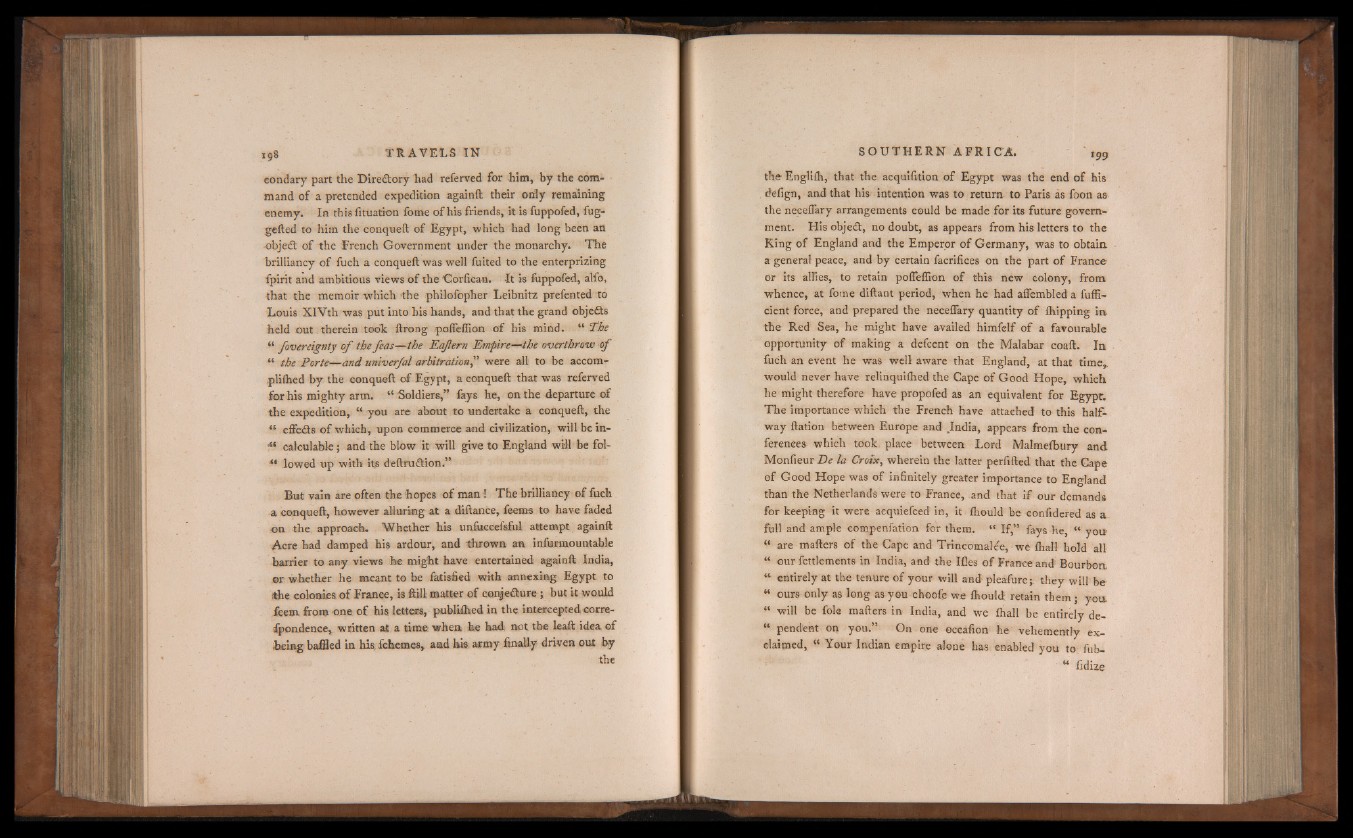
eondary part the Directory had referved for him, by the command
of a pretended expedition againft their only remaining
enemy. In this fituation fome of his friends, it is fuppofed, fug-
gefted to him the conqueft of Egypt, which had long been an
objeCt of the French Government tinder the monarchy. The
brilliancy of fuch a conqueft was well fuited to the enterprizing
fpirit and ambitious views of the Corfican. It is fuppofed, alfo,
that the memoir which the philofopher Leibnitz prefented to
Louis XlVth was put into bis hands, and that the grand objefls
held out .therein took ftrong pofleffion of his mind. “ The
“ fovereignty o f the feas—the Eaflern Empire—the overthrow of
“ the Porte— and univerfal arbitration,” were all to be accotn-
.pliihed by the conqueft of Egypt, a conqueft that was referved
for his mighty arm. “ Soldiers,” fays he, on the departure of
the expedition, “ you are about to undertake a conqueft, the
“ effects of which, upon commerce and civilization, will be in-
*“ calculable; and the blow it will give to England will be fol-
11 lowed up with its deftruCtion.”
But vain are often the hopes of man! The brilliancy of fuch
a conqueft, however alluring at a diftance, feems to have faded
on the approach. Whether his unfuccefsful attempt againft
Acre had damped his ardour, and thrown an infurmountahle
barrier to any views he might have entertained againft India,
©r whether he meant to be fatisfied with annexing Egypt to
¡die colonies of France, is ftill matter of conjecture; but it would
feem from one of his letters, published in the, intercepted cotre-
fpondence, written at a time when be had: not the leaft idea of
being baffled in his fchemes, and his army finally driven out by
the
the Engliffi, that the acquifition of Egypt was the end of his
defign, and that his intention was to return to Paris as foon as
the neceflary arrangements could be made for its future government.
His objeCt, no doubt, as appears from his letters to the
King of England and the Emperor of Germany, was to obtain
a general peace, and by certain facrifices on the part of France
or its allies, to retain pofleffion of this new colony, from
whence, at fome diftant period, when he had afiembled a fuffi-
Cient force, and prepared the neceflary quantity of ihipping in
the Red Sea, he might have availed himfelf of a favourable
opportunity of making a defcent on the Malabar coaft. In
fuch an event he was well aware that England, at that time,
would never have relinquiffied the Cape of Good Hope, which
he might therefore have propofed as an equivalent for Egypt.
The importance which the French have attached to this halfway
ftation between Europe and .India, appears from the conferences
which took place between Lord Malmeibury and
Monfieur Be la Croix, wherein the latter perfifted that the Cape
of Good Hope was of infinitely greater importance to England
than the Netherlands were to France, and that if our demands
for keeping it were acquiefced in, it ihould be eonfidered as a
full and ample eompenfation for them. “ If,” fays he, “ you
“ are matters of the Cape and Trincomalee, we ffiall hold all
“ our fettlements in India, and the Ifles of France and Bourbon
“ entirely at the tenure of your will and pleafure;. they will be
“ ours only as long as you choofe we ihould retain them ; yon
“ will be foie matters in India, and we ffiall be entirely de-
“ pendent on you.” On one occafion he vehemently exclaimed,
“ Your Indian empire alone has enabled you to fub-
“ fidize